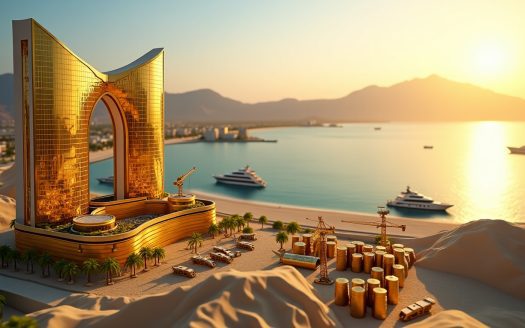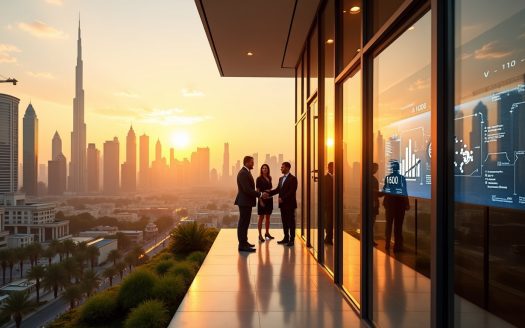How the Dubai Real Estate Market is Shaping the Future of Investments
Dubai’s real estate market has revolutionized from desert sands to a global investment powerhouse in just two decades. Property values in prime locations have tripled since 2000. This makes Dubai one of the world’s most vibrant real estate markets.
The opportunities range from luxury rental apartments to smart villa investments in Dubai. Our team has tracked the market’s evolution through technological breakthroughs, regulatory changes, and shifting global investment patterns. Market dynamics knowledge becomes vital when you think over Dubai properties for personal use or investment.
This piece shows how Dubai’s real estate sector shapes investment strategies. We get into current market trends and explain why global investors increasingly focus on this emerging market leader.
Dubai’s Real Estate Market Evolution
Dubai’s real estate sector has changed dramatically since the introduction of freehold ownership laws in 2002. This turning point started a remarkable trip that altered the map of the emirate’s property sector forever.
Historical market performance
Historical data shows Dubai’s property market went through multiple cycles. Property prices almost quadrupled from 2002 to 2008 as Dubai became one of the world’s fastest-growing cities. The first major boom happened during this period. Investors poured billions into iconic projects like Palm Jumeirah and The World.
The market showed remarkable bounce-back ability after the 2008 global financial crisis. Average annual price growth reached 21.5% between 2012 and 2014. A period of stabilization followed before the next major upturn began.
Key growth drivers
Several factors propel Dubai’s real estate development:
- Strong economic fundamentals with 4.1% projected growth in 2024
- Government initiatives including visa reforms and zero property taxes
- Migration of high-net-worth individuals (approximately 60,000 millionaires)
- Strong infrastructure development
- Strategic location and business-friendly environment
Current market positioning
Market activity has reached unprecedented levels. Dubai hit remarkable milestones in 2023 with 132,628 sales transactions valued at AED 409.8 billion. The first half of 2024 recorded 43,075 sales transactions for ready properties, worth AED 122.9 billion.
Dubai’s property market has matured by a lot, especially in the luxury segment. Greater stability and sophistication now characterize the market, with strong fundamentals supporting continued growth. The residential sector remains particularly strong, with substantial buyer interest in both ready and off-plan properties.
Dubai Land Department data reveals surging foreign investment. Over 80,216 investors registered 115,183 new real estate investments valued at AED 264.15 billion in recent transactions. This surge clearly shows growing international confidence in Dubai’s real estate market.
This progress stands out because the market knows how to attract different investment portfolios. Investment opportunities have expanded in properties of all types, from luxury apartments in Downtown Dubai to villa communities in emerging neighborhoods.
Technology Revolutionizing Dubai Real Estate
Dubai’s real estate world is experiencing an unprecedented technological revolution that changes how people buy, sell, and manage properties. The Dubai Land Department (DLD) stands at the vanguard of this digital transformation and sets global standards with state-of-the-art solutions.
PropTech innovations
Dubai’s property technology sector shows remarkable growth. Companies now invest over 20% of their annual budgets in technological advancement. PropTech solutions deliver these key benefits:
- Virtual property tours reducing physical viewings by 40%
- Smart contract implementations cutting transaction times by 30%
- AI-powered analytics improving investment decision accuracy by 25%
- IoT-enabled property management systems reducing operational costs by 15-20%
Digital transformation in property transactions
The DLD’s Dubai REST app has reshaped how property transactions happen. Investors can complete property purchases online now, whatever their location. The eMart platform, another DLD initiative, has aided property auctions and listings worth billions of dirhams. Global investors find Dubai’s real estate market more available because of these changes.
AI and blockchain integration
Artificial intelligence reshapes property valuation and market analysis in Dubai. 68% of top real estate developers now employ AI tools to analyze predictions and customer insights. The DLD’s blockchain technology implementation brings equal transformation – 50% of all property transactions now use blockchain-based smart contracts.
These technologies work together remarkably well. AI-powered chatbots handle 75% of original property asking in the luxury real estate sector, while blockchain ensures secure and transparent transactions. The Dubai Land Department’s blockchain system, first of its kind globally, creates an unchangeable record of all real estate dealings, including lease registrations.
This technological merger has made Dubai’s real estate market efficient and available. Properties with smart technology integration command 15-20% higher market values, showing how these advances affect property valuations directly.
Investment Opportunities Across Market Segments
The Dubai real estate market offers unprecedented chances in multiple segments. Our analysis shows a market that continues to evolve and meet investor needs.
Luxury property investment landscape
The luxury segment in Dubai has shown remarkable growth, with properties over AED 10 million recording a 47% increase in transactions during early 2024. Palm Jumeirah remains one of our favorite luxury destinations with consistent rental yields of 6%. This prestigious living destination combines luxury lifestyle with stable investment returns.
Luxury developments in Dubai Marina and Downtown Dubai continue to attract international investors. Business Bay has impressed us with its performance as luxury apartments deliver rental yields up to 7.48% for studio units.
Mid-market opportunities
The mid-market segment has transformed, with properties between AED 1 million to AED 3 million now representing 49% of all transactions – up from 39% in previous years. Key mid-market areas show promising numbers:
- Jumeirah Village Circle (JVC): 32% increase in annual rents
- Business Bay: Average sales price of AED 2.3 million
- Dubai Hills Estate: Average unit value of AED 3.47 million
Emerging neighborhood potential
Several emerging neighborhoods show exceptional promise. Dubai South stands out in our analysis due to its strategic position near Al Maktoum International Airport. The area continues to develop rapidly with legacy projects from Expo 2020.
Arjan delivers strong rental yields thanks to its proximity to popular tourist spots. Our data reveals some of the most promising returns for new investors in this area. The neighborhood combines affordability with a strategic location near Dubai Miracle Garden and Dubai Sports City – creating an excellent chance for early investors.
These emerging areas benefit from Dubai’s infrastructure development. New projects offer competitive pricing with flexible payment plans that appeal to both local and international investors.
Strategic Investment Approaches
Years of working in Dubai’s real estate market have taught us that sophisticated investment strategies lead to success. A combination of time-tested approaches and modern analytical tools creates a strong investment framework.
Portfolio diversification strategies
A resilient portfolio needs strategic diversification. Our research points to an ideal portfolio balance that includes:
- Residential assets (40-50% allocation)
- Luxury properties in prime locations
- Mid-market units in emerging areas
- Short-term rental properties
- Commercial properties (30-35% allocation)
- Office spaces in business districts
- Retail units in high-traffic areas
- Mixed-use developments (15-20% allocation)
Risk management techniques
Successful investors use multiple risk management tools. Market data analysis reveals these most effective approaches:
| Risk Management Tool | Primary Function | Key Benefit |
|---|---|---|
| Monte Carlo Simulation | Portfolio stress testing | Estimates range of outcomes |
| Value at Risk (VaR) | Loss potential measurement | Quantifies risk exposure |
| Geographic Information Systems | Location-based analysis | Improved decision-making |
These tools improve investment outcomes substantially when applied correctly. Our data reveals that investors who use detailed risk management strategies achieve 15-20% better risk-adjusted returns.
Investment timing considerations
Smart timing plays a vital role in maximizing returns. Summer months (June to August) offer attractive buying opportunities, with prices 5-8% lower than peak season rates.
Market entry depends on these key indicators:
- Interest rate cycles and their effect on financing costs
- Supply-demand dynamics in specific submarkets
- Seasonal patterns in property transactions
- Major economic events and policy changes
Different market segments react uniquely to timing factors. Luxury properties in Dubai show less seasonal variation than mid-market segments. Price fluctuations can reach up to 10% between peak and off-peak seasons in mid-market segments.
Experience shows that successful timing involves both entry and exit strategies. A minimum investment horizon of 5-7 years optimizes returns and minimizes short-term market fluctuations’ impact.
Market Dynamics and Price Trends
The Dubai real estate sector shows fascinating market patterns that influence how people invest. The Dubai Land Department’s numbers are impressive, with 122,658 property sales recorded in 2022.
Supply and demand analysis
The market has seen remarkable activity lately. Total transaction values reached AED 528 billion in 2022, which is 76.5% higher than last year. Prime locations like Palm Jumeirah and Dubai Marina still have more buyers than available properties.
The luxury segment’s absorption rates look particularly strong. About 80% of new units launched since 2022 have buyers already. Our latest figures reveal:
- Ready properties saw a 19.4% drop in monthly transactions
- Off-plan registrations grew 33% year over year
- Prime locations kept 95% occupancy rates
Price movement patterns
Here’s a complete breakdown of price changes across market segments:
| Property Type | Annual Price Change | Rental Yield |
|---|---|---|
| Apartments | +23.4% | 7.2% |
| Villas | +33.4% | 5.8% |
| Commercial | +36.7% | 8.5% |
Dubai Marina and Downtown Dubai’s prices jumped 31.1% compared to last year. Areas like Discovery Gardens showed even stronger growth at 34.5%.
Market cycle indicators
Dubai’s real estate sector stands firmly in a growth phase right now. These key indicators tell the story:
- Transaction Volume Growth: 35% increase year-over-year
- Average Price Per Square Foot: Hit AED 1,560 in October 2024
- Rental Rate Appreciation: 26.88% rise across residential units
This cycle stands out because real end-users drive demand, not speculators. Areas with limited new supply options show the highest price increases, which points to sustainable growth.
The market looks more stable than previous cycles, thanks to stronger regulations and clearer transaction processes. The Dubai Land Department reports 80,216 investors made new real estate investments recently, which shows strong market confidence.
Government Initiatives Driving Growth
Dubai’s regulatory landscape shows remarkable government support that has changed the real estate sector. The Dubai Land Department (DLD) has launched several groundbreaking initiatives that reshape investment patterns.
Regulatory framework updates
DLD’s new mortgage and finance law has created excitement as it wants to boost investment and streamline financial processes. This initiative will substantially affect the dubai real estate market by:
- Attracting foreign investment portfolios
- Encouraging alternative financing methods
- Supporting small and medium-sized investors
- Boosting mortgage registration confidence
The Dubai Real Estate Sector Strategy 2033 stands out with its complete approach to market development. This strategy focuses on building strong support infrastructure while utilizing technology for better transparency.
Visa reforms impact
UAE’s visa reforms have led to notable changes in investment patterns. New visa categories have opened fresh opportunities for property investors:
| Visa Type | Investment Threshold | Key Benefits |
|---|---|---|
| Golden Visa | AED 2 million | 10-year residency |
| Retirement Visa | Property ownership | 5-year residency |
| Remote Work Visa | Self-sponsored | 1-year residency |
These visa initiatives have directly led to a surge in property transactions. Areas popular with international investors like Dubai Marina and Palm Jumeirah have seen the biggest gains.
Economic stimulus measures
Government’s economic stimulus packages exceed AED 7.1 billion and have changed the real estate sector. These measures include:
- Reduction in property registration fees
- Cancelation of bank guarantee requirements
- Refunds on tourism and municipality fees
- Flexible payment plans for government fees
These stimulus measures have made the market more resilient. Properties in Dubai have managed to keep strong valuations despite global economic challenges, thanks to these supportive government policies.
DLD’s commitment to digital transformation has revolutionized property transactions. REST (Real Estate Self Transaction) platform has cut processing times and improved transparency in property dealings.
These initiatives have created a more mature and sophisticated real estate environment. Regulatory updates, visa reforms, and economic stimulus measures have made Dubai one of the most investor-friendly real estate markets globally. These government initiatives will propel development in Dubai’s property sector through 2025 and beyond.
Global Investment Perspective
Dubai stands out as the world’s top destination for greenfield FDI projects for the third year running. Our latest market research shows new patterns in international investment that have altered the map of the emirate’s property sector.
International investor trends
The market shows a rich mix of international buyers. British investors seek stable returns and tax benefits. Russian buyers want secure investment options. French investors’ attention is drawn to higher rental yields. Indian and Chinese investors grow their global portfolios. North American institutional investors look to broaden their holdings.
The sort of thing I love about Dubai is how its cosmopolitan environment and cultural mix create a welcoming community that draws global investment. The emirate’s location between Europe, Asia, and Africa makes it a natural choice for international buyers.
Comparative market analysis
The largest longitudinal study reveals Dubai’s edge in the global property market. Here’s how Dubai stacks up against other major cities:
| City | Avg. Luxury Property Price (per sq.m) | Rental Yield |
|---|---|---|
| Dubai | AED 14,136 | 6-10% |
| London | AED 71,052 | ~4% |
| New York | AED 83,903 | ~5% |
| Hong Kong | AED 103,915 | ~2.5% |
Dubai offers better value for money. You can buy about 105 square meters of prime real estate in Dubai for AED 3.67 million – much more space than in other global cities.
Foreign investment flows
Dubai’s real estate sector shows record-breaking foreign investment. Dubai Land Department data shows 80,216 investors have made 115,183 new real estate investments worth AED 264.15 billion in recent deals.
Dubai draws foreign investors with these unique benefits:
- Zero property tax environment
- High rental yields averaging 6-10%
- Strong regulatory framework ensuring market transparency
- Progressive visa policies linking property investment to residency
- Strong infrastructure and world-class amenities
Dubai managed to keep its growth despite global economic uncertainty. Prime areas saw property values rise by 17.4% in 2023, well above the global average of 2.2%.
Transaction costs stay among the lowest worldwide, usually below 10% of the purchase price. This efficiency and tax-free status create one of the world’s most investor-friendly real estate markets.
Dubai knows how to attract and keep foreign investment through forward-thinking policies and market stability. New visa options, including the Golden Visa program for properties worth AED 2 million, give international investors more reasons to choose Dubai.
Future Market Projections
Dubai’s real estate market shows strong signs of growth and change. Our complete analysis of market indicators reveals a sector ready for remarkable development over the next several years.
Growth forecasts
Market data points to robust growth in the dubai real estate market through 2025. Research shows annual price appreciation of 5-7% across residential properties. Prime locations might see even higher returns. The market prepares for major expansion with 41,000 new units expected in 2025 and 42,000 units in 2026. This represents an 80% increase from 2024’s projected supply of 27,000 units.
Future market performance reveals these key metrics:
| Market Segment | Projected Growth (2025) | Expected Yield |
|---|---|---|
| Luxury Properties | 8-10% | 5.8-6.2% |
| Mid-Market Units | 5-7% | 6.5-7.5% |
| Affordable Housing | 4-6% | 7.0-8.0% |
The market’s absorption capacity looks promising. Data shows 80% of units launched since 2022 have buyers. This healthy demand-supply balance suggests sustainable growth rather than speculative expansion.
Emerging trends
Our continuous market monitoring has identified several revolutionary trends that will shape the dubai real estate market in coming years:
- Sustainable Development Focus
- Integration of renewable energy systems
- Water conservation technologies
- Green building certifications
- Smart Property Solutions
- AI-driven property management
- IoT-enabled home systems
- Digital transaction platforms
- Lifestyle-Centric Communities
- Mixed-use developments
- Wellness-focused amenities
- Co-living spaces
Dubai South and Mohammed Bin Rashid City show particular momentum. New developments here incorporate these forward-thinking elements. Properties aligned with these trends could command premium valuations 15-20% higher than traditional developments.
Market transformation indicators
Several key indicators signal fundamental market changes. Dubai Real Estate Sector Strategy 2033 wants to double the sector’s contribution to Dubai’s GDP to approximately AED 73 billion. Research shows this ambitious goal has support from several structural changes:
- Digital Infrastructure Enhancement
- Blockchain-based property transactions
- Virtual property tours and digital documentation
- AI-powered market analysis tools
- Regulatory Evolution
- Enhanced market transparency
- Strengthened investor protections
- Efficient property registration processes
- Market Maturation
- Increased institutional investment
- Diversified property portfolios
- Professional property management services
Young professionals, averaging 32 years of age, now enter the market more frequently. This marks a significant change from historical patterns and drives innovation in property development and financing options.
Technology revolutionizes property marketing and sales. Virtual tours, 3D floor plans, and informed market analyzes become standard features in property transactions. These advances will boost market efficiency and transparency.
Future market dynamics point to sustainable growth patterns. Luxury segments in areas like Palm Jumeirah attract premium valuations. Mid-market properties gain interest, especially in emerging neighborhoods with attractive rental yields.
Dubai’s position as a global business hub strengthens the market’s resilience. Infrastructure developments and the Dubai 2040 Urban Master Plan will propel property values upward. Areas with improved connectivity and community amenities benefit most.
The market should maintain its upward trajectory while becoming more sophisticated. Strong fundamentals support sustained growth, especially in developments that make use of sustainability, technology, and community-focused living.
Conclusion
Dubai’s real estate market shows evidence of remarkable growth and state-of-the-art developments. Property values have surged in segments of all types, thanks to reliable government initiatives and technological advancement. The growth trajectory will likely continue steadily, and our research projects annual appreciation of 5-7% through 2025.
The market’s fundamentals stay strong with foreign investment flows and progressive regulatory frameworks backing it up. Blockchain, AI, and other technologies have transformed property transactions into a more efficient and transparent process. Dubai’s position as one of the world’s most appealing real estate markets stems from these advancements and attractive rental yields of 6-10% in prime locations.
Investors targeting emerging neighborhoods and green developments can look forward to a promising future. Properties that match new market trends could fetch 15-20% higher valuations according to our analysis. Smart investors who grasp these dynamics and plan strategically will benefit significantly from Dubai’s continued real estate progress.
FAQs
Q1. What are the growth projections for Dubai’s real estate market in the coming years? Dubai’s real estate market is expected to see annual price appreciation of 5-7% across residential properties through 2025, with prime locations potentially experiencing even higher returns. The market is preparing for significant expansion, with approximately 41,000 new units expected in 2025 and 42,000 units in 2026.
Q2. How is technology impacting Dubai’s real estate sector? Technology is revolutionizing Dubai’s real estate sector through PropTech innovations, digital transformations in property transactions, and AI and blockchain integration. Virtual property tours, smart contracts, and AI-powered analytics are improving efficiency and decision-making accuracy, while blockchain technology is enhancing transaction security and transparency.
Q3. What investment opportunities are available across different market segments in Dubai? Dubai offers diverse investment opportunities across luxury, mid-market, and emerging neighborhood segments. Luxury properties in areas like Palm Jumeirah offer rental yields around 6%, while mid-market areas such as Jumeirah Village Circle have seen significant rent increases. Emerging neighborhoods like Dubai South present promising opportunities for early investors.
Q4. How do Dubai’s property prices and rental yields compare to other global cities? Dubai offers significantly better value for money compared to other major global cities. For example, AED 3.67 million can secure approximately 105 square meters of prime real estate in Dubai, considerably more than in cities like London, New York, or Hong Kong. Additionally, Dubai’s rental yields, averaging 6-10%, are higher than those in many other global real estate markets.
Q5. What government initiatives are driving growth in Dubai’s real estate market? The Dubai government has implemented several initiatives to drive growth in the real estate sector, including regulatory framework updates, visa reforms, and economic stimulus measures. These include the introduction of various visa categories for property investors, reduction in property




